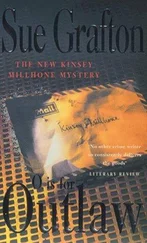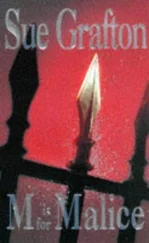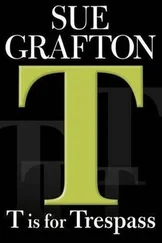I returned the directories to the shelf and then crossed to the section where the telephone directories were lined up. I pulled the current Santa Teresa phone book and looked in the S’s, running down the listings until I came to “Sanchez, P. F.” His telephone number was the same, as was his address on Zarina Avenue. Where the heck was that?
I walked back to my office, sat down at my desk, and hauled out my Thomas Guide to Santa Teresa and Perdido Counties. Zarina Avenue was actually in Perdido County, one of half a dozen streets that formed a grid in the tiny coastal town of Puerto, a name that had morphed into the longer Puerto Polvoriento, which was then shortened to P. Pol and from there to Peephole. I sat and pondered the geography. I’d hoped to feel better informed, which in some ways I was. What puzzled me now was why a man who lived in Peephole would bury his dead dog in Horton Ravine, a good fifteen miles north. There must have been some quirky set of circumstances to explain the digging of the dog’s grave at such a remove.
I put my feet up on the desk, leaned back in my swivel chair, and put a call through to Cheney Phillips at the PD. After two rings he picked up and when I identified myself, I could hear the smile in his voice. “Hey, kid. I hope you didn’t take offense at my teasing you about the doggie exhumation.”
“You know me better than that. I’m just thankful Mary Claire Fitzhugh wasn’t buried in that hole,” I said. “I’m sorry about the waste of manpower. I owe you one.”
“If I had a dollar for every lead that didn’t pan out, I’d be rich. Anyway, I’m the one who referred the kid to you in the first place so it’s not like you cooked this up on your own.”
“I do feel for him. How embarrassing.”
“He’ll survive,” Cheney said.
“So what’s the story on Diana Sutton?”
There was a pause. “Refresh my memory.”
“Sorry. I should have said Diana Alvarez.”
“The reporter? What about her?”
“Did you know she was Michael Sutton’s sister?”
“You’re not serious. I knew she was persistent, but I wrote it off to her job. How do you know her?”
“I don’t, or at least I didn’t until Friday morning. She came into my office, took a seat, and unloaded with both barrels.”
I filled him in on Sutton’s sorry tale of woe, at the end of which he said, “Even if I’d known his sordid history, I’d have reacted the same way. I thought his story had a ring of truth.”
“Me, too. Apparently, she’s made it her mission to screw him over any chance she can. The dog gave her the ammunition to go after him again.”
“Hold on a second.” He put a hand over the mouthpiece and then came back. “I gotta scoot. Anything else?”
“One quick question. Can you tell me the dog’s breed? I know the body must have been in bad shape, but could you tell anything about him from what was left?”
“Well, he was big… I’d say seventy to eighty pounds once upon a time. Most of his coat was intact. The hair was long and coarse, a mix of black and gray, with maybe some shades of brown thrown in. It looked like the tag was an afterthought, tossed in on top of him.”
“A German shepherd?”
“Something like that. Why?”
“I was just curious.”
“Oh, lord. Not again. Stay out of trouble if you can,” he said, and hung up.
I took a moment to place a call to Phoenix, Arizona, filling in the HR director on her phantom executive. She gave me a fax number and asked for an account of my coverage. I typed up my notes and then walked one block over to a notary’s office and used her fax machine. I had two pages to send and the process took five minutes, which I thought was nothing short of miraculous. One day I’d break down and buy a machine of my own, but to date I didn’t need one often enough to justify the expense.
I retrieved my Mustang, gassed up at the entrance to the 101, and headed down the coast to Peephole (population 400). The area, like so much of California, was part of a Spanish land grant, deeded to Amador Santiago Delgado in 1831. His mother was distantly related to Maria Christina of Bourbon-Two Sicilies, the fourth wife of King Ferdinand VII, and the only one of his wives to bear him living offspring. There was no clear explanation for Maria Christina’s generosity, but Amador inherited title to the land when his mother died. He and his young bride, Dulcinea Medina Vargas, traveled from Barcelona to Perdido, California, took possession of the tract, and established a large working ranch devoted to the raising of purebred Spanish horses. Within a year Dulcinea died giving birth to their only child, a daughter, Pilar Santiago Medina. Bereft, Amador sold off his horses and turned to the deeply satisfying solace of drink. On his death in 1860, Pilar inherited his massive landholdings, which had largely reverted to the elements. At the time she was thirty years old and not a beautiful woman, but she was clever and her wealth more than compensated for the hefty frame and plain countenance Nature had bestowed on her.
When the Homestead Act was passed in 1862, land-hungry settlers poured into California from all over the country, eager to claim the 160 acres (65 hectares) per person promised by the government. Harry Flannagan was one of these. He was a blue-eyed Irishman, with bright red hair, muscular arms, and a strong back and shoulders geared for hard labor. In Ireland, Harry Flannagan had been a poor man and the opportunity to own land was heady stuff to him. He took his time, traveling up and down the California coast for months before he chose his spot and filed a claim with the nearest land office in Los Angeles. As was required, he attested that he was twenty-one years of age and swore he’d never borne arms against the United States or given comfort to its enemies. He further declared his intention of improving the plot with crops and a dwelling, with the understanding that if he was still on the land in five years, the property would be his free and clear.
The rugged acreage he’d chosen was beautiful, but there was little or no fresh water on it and farming was precarious. Despite its proximity to the Pacific Ocean, the land was arid and the irony wasn’t lost on him: nothing but water as far as the eye could see and none of it was usable. No one bothered to tell him that for the past twenty-five years the idyllic-looking harbor had been known as Puerto Polvoriento, “Port Dusty.” Regardless of its obvious shortcomings, he was convinced he could turn the land to his advantage and he set about it with a will.
The only small impediment to his ambition was the fact that the sixty-five hectares he’d laid claim to infringed in its entirety on the land that belonged to Pilar Santiago-Vargas. Not surprisingly, this came to her attention, which prompted her to mount her horse and ride out to challenge the audacious interloper. It was never clear how the encounter played out or what wiles the plucky farmer employed in defense of his hopes, but the upshot was that Harry Flannagan took Pilar Santiago-Vargas as his lawful wedded wife within the month. He was not, after all, a man to quibble about a few excess pounds. With regard to her homeliness, he was also motivated to make allowances. Some eight and a half months later she bore him a son-the first of seven boys who arrived at two-year intervals, a band of fiery-haired Hispanics. By agreement, Pilar and Harry took turns naming their boychicks, who were, respectively, Joaquin, Ronan, Bendicto, Andrew, Miguel, Liam, and Placido.
Harry and Pilar were married for fifty-six years, until he was struck down in the influenza epidemic of 1918. Pilar lived on another fifteen years and died in 1933 at the age of 101. Harry’s crowning achievement was the founding of the Flannagan Water Company, which provided water to the citizens of Peephole for twenty-five cents a gallon, making him rich beyond imagining. Thereafter, he spear-headed construction of the Puerto Dam, which was completed in 1901 and provided a distribution system that delivered running water to the town.
Читать дальше












